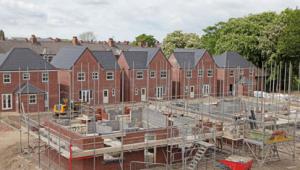The economy contracted by 0.3% in the first three months of this year, a greater fall in output than previously thought, the Office for National Statistics has revealed.
Last month’s initial estimate of a 0.2% contraction for the quarter had already signalled that the UK was back in recession, as it followed a drop in the previous three months of 0.3.%.The figure has been revised upwards today due to a bigger-than-expected fall in the construction sector. Once full information on the work undertaken in March was included, output fell by 4.8% over the three months, compared with a 3% estimate.
The figures for the production and service sectors have not changed from the first estimate and remain at a 0.4% fall and 0.1% growth respectively.
Responding to the figures, the Institute for Public Policy Research’s chief economist Tony Dolphin warned the government that it was now ‘time for action’ on the economy. He highlighted the statement published by the International Monetary Fund earlier this week which urged UK authorities to take action to support growth if downside risks materialise and the recovery fails to take off.
‘No more evidence should be needed that the recovery is failing to take off,’ Dolphin said.
‘The Monetary Policy Committee should authorise an increase in the scale of quantitative easing at its next monthly meeting and the chancellor should ease fiscal policy through a temporary cut in national insurance contributions and a boost to infrastructure spending. It is too late for contingency planning – it is time for action.’
He added that construction was weak because of the slump in house building and the decline of public sector capital.
The British Chambers of Commerce said that the larger contraction underlined the need for the government ‘to implement a bold, long-term strategy for growth’, including infrastructure investment and ‘real deregulation’.
The downwards revision was disappointing but hadn’t come as a huge surprise, chief economist David Kern said.
‘The fall in output from the erratic construction sector was even bigger than originally thought, and this is acting as a drag on growth. Consumer spending rose slightly but total capital investment fell, with an increase in business investment and a drop in government investment. The figures also show that imports increased more than exports.’
However, there are now ‘fundamental doubts about the accuracy of the ONS’s estimates’, he added.
‘Virtually every business survey has indicated positive growth in the economy in the first quarter. Furthermore, the ONS’s own labour market figures have shown an increase in employment and a 0.9% increase in the actual number of hours worked, which makes a quarterly fall in GDP difficult to comprehend. It is possible that the GDP estimate will be revised upwards later in the year.’
Trade union Unison warned there was a ‘very real prospect’ of a third successive quarter of contraction in the period covering April to June.
General secretary Dave Prentis said: ‘A new set of cuts, pay freezes and job losses kicked in from the start of April – sucking yet more demand out of the economy and further reducing our chances of growth.
‘The government needs to stop blaming our economic woes on the crisis engulfing Europe and admit that its obsession with austerity is the main obstacle standing in the way of our economic recovery.’





















